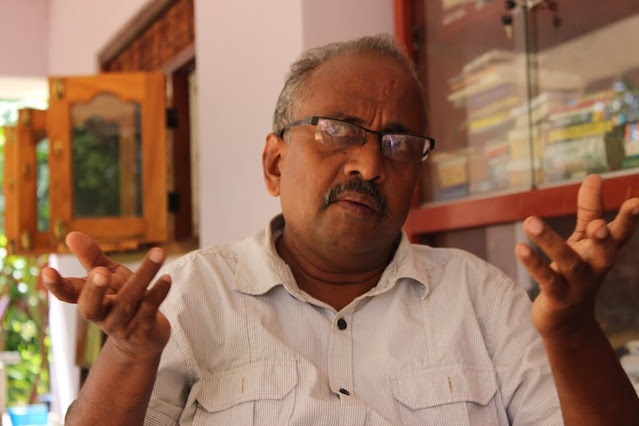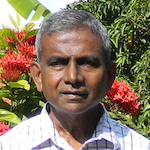Felicitation To A Friend & Resolute Marxist

By Rajan Hoole –May 8, 2017
In the normal course of events my long friendship and brotherly regard for Sritharan, or Sugu, as he is called, and to several of his colleagues, particularly Subathiran, or Robert, would have been unusual. Those of us whose training had a professional bias and had successful careers with domestic felicity mapped out for us, often ceased to think about things that really matter. That would normally have been perfectly all right. But when these persons also had a vicarious urge to be heroes of Tamil nationalism, they also gave their voice and tacit approval to maligning and killing as traitors, those who thought and felt for the utterly hapless plight of ordinary people, repeatedly forced into wars they never wanted.
For persons who took the road that Sugu took, life has been full of painful challenges that would have broken most of us. Sugu’s political career goes back to about the era of the 1980 general strike for very basic workers’ demands that was brutally broken up by JR’s government, using JSS thugs, whom President JR ordered to have a counter-demonstration on 24thMay. They were used again in the 1983 communal violence. This was the last time perhaps when there was an organised workers’ movement, supported by leading figures as Bishop Lakshman Wickremesinghe. It was also a testing time for the Tamil nationalists. My colleague Sritharan, who was then a lecturer in Jaffna University, went with a delegation to ask the leadership of the TULF to express solidarity with the workers. They were evasive and Mr. Sivasithamparam suggested to them that it was a Sinhalese problem that did not concern the Tamils. Being the main opposition party this was irresponsible and insensitive. After what happened subsequently, I need not expatiate on the historic irony and stupidity of that position, waiting for JR to deliver.

Sritharan Thirunavukarasu
Those like Sugu, who were early members of the EPRLF, struggled both intellectually and emotionally, to start a people’s movement that would be both internationalist and rigorously dedicated to the interests of the people, going against the high tide of Tamil nationalism that brought the LTTE to the fore. It is not hard to understand why several of those who were with him, from Balakumar’s section of the EROS to Premachandran, more recently, plunged into the Tamil nationalist tide that swept people along to the horrors of Mullivaykkal.
To give a flavour of the EPRLF in the 1980s, I will do well to quote N. Pathmanathan, one of our leading civil servants, who did a term in prison under the PTA from 1983 to 1987. He was helping other PTA detainees to prepare their cases. He was astounded upon reading the charges against an EPRLF prisoner caught putting up posters in Vavuniya, which called upon Tamil and Sinhalese workers to get together and launch a united struggle to establish a workers’ state that would guarantee equality to everyone. Pathmanathan was struck by the irony of detaining on a separatist charge, a man who should have been honoured for his dedication to national unity.
Sugu, whom we felicitate today on the launch of his book, we may say belongs to the remnants of the historic workers’ movement that took a last stand on their behalf in 1980. The crushing of that movement enabled the same methods to be used against Tamils while our leaders slept. Sugu is among the rare souls who have been through decades of fury and murder and have come out with their character unblemished. What helped him along was his sound intellect, constantly renewing itself through study, interaction with the world and compassion for the suffering. It is the kind of quality intellect that would be out of place in protected academic establishments where place-hunting is the norm. A scholarly mind as Sugu’s is rooted in a large universe spanning space and time, and derives confidence and reassurance from the wisdom of the ages.
The collection of his articles titled ‘To a new generation that consecrates Humanity’ is dedicated to ‘the dead and disappeared in the struggle for the dawn of humanity’ where he quotes Bharathy’s dedication to the freedom fighters of India – ‘[May their] dreams come true’. Both Bharathy and the lines from Tagore he quotes “Where the mind is without fear…Where the clear stream of reason has not lost its way…Into that heaven of freedom, my Father, let my country awake”, are an indicator of the man’s heart and his aspirations.
Like the two of his mentors, Sugu is an unswerving internationalist. This comes through in his article on the US – British led invasion of Iraq in 2003 and his joy at the Arab Spring and anxiety at its delicacy. Through his sense of reality and disappointments he has faced, he tries to see things in the light of reason and the way the world works, and his emotion is characteristically restrained. As a man who placed his life on the line in search of a liberated order, his words have a poignant ring, when he describes the culture of murder that struck parents and children at unseemly hours, and abducted children to fight wars that the elite were running away from, and remarks: “For us who have adopted such abominable practices to seek franchise and recognition in the civilised world is utterly unworthy.”

